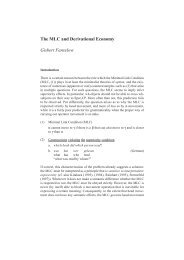The Dative – an Oblique Case
The Dative – an Oblique Case
The Dative – an Oblique Case
You also want an ePaper? Increase the reach of your titles
YUMPU automatically turns print PDFs into web optimized ePapers that Google loves.
that at least one person almnost every house in this street inhabits<br />
(v) DASS mindestens ein Angestellter fast jeder Firma treu bleibt<br />
that at least one employee almost every comp<strong>an</strong>y-DAT loyal remains<br />
(vi) DASS er mindestens ein Päckchen Zigaretten in fast jeder Schublade f<strong>an</strong>d<br />
that he at least on pack of cigarettes in almost every drawer found<br />
For further arguments against Frey’s <strong>an</strong>alysis see F<strong>an</strong>selow (1995b).<br />
4 <strong>The</strong>re is a subtle contrast between these two sentences: in (12.a) nomads appear to be more frequent on the<br />
market, in (12.b) it is the Rom<strong>an</strong>s. This contrast does not occur with the sem<strong>an</strong>tically nearly identical<br />
accusative assigning verb treffen (13.)..<br />
5 <strong>The</strong>re are some rare cases with unmarked ACC > NOM order as in (i), but all theses examples are idiomatic<br />
as far as we c<strong>an</strong> see.<br />
(i) Ihn hat der Schlag getroffen<br />
Him-ACC has the stroke-NOM hit (‘He was floored’)<br />
6 Haider gives further examples that raise strong doubts about derivational <strong>an</strong>alyses of VP-remn<strong>an</strong>t<br />
topicalization, one of them is the following:<br />
(i) Briefe geschrieben hat sie mir nur drei traurige bis jetzt<br />
Letters written has she me-DAT only three sad up to now<br />
(ii) *Sie hat mir nur drei traurige bis jetzt Briefe geschrieben<br />
As (ii) shows, it is impossible to construct a VP remn<strong>an</strong>t via scrambling of the adjectival part of the split<br />
DP, in order to yield a basis for the derivation of (i).<br />
7 One alternative view is that the whole phenomenon of markedness is due to pragmatics <strong>–</strong> as proposed by<br />
Cooper (1994). In this case a ‘NOM > ACC’ rule has to be stated as a non-syntactic, cognitive constraint. This<br />
would be artificial, because this ‘constraint’ is simply <strong>an</strong> outcome of the syntax of structural cases. We get it<br />
for free from syntax proper. From the point of view of Chomsky (1995) structural case features are solely<br />
morphosyntactic <strong>an</strong>d simply ‘invisible’ outside the ‘syntax module’.<br />
8 From this statement one would expect that in every case of ditr<strong>an</strong>sitive constructions with <strong>an</strong>imate subjects<br />
<strong>an</strong>d datives we find two unmarked word orders, with the dative either in front of or behind the subject. This<br />
is very rarely the case. <strong>The</strong>re is a second kind of conceptual constraint at work, which is well-known: the<br />
agentivity hierarchy. Agents are ‘naturally emphasized’ by the conceptual system <strong>–</strong> so they are the most<br />
prominent arguments in the unmarked case. Every theory of thematic roles, linking <strong>an</strong>d thematic<br />
interpretation reflects this empirical fact in one or the other way. Cf. also the discussion in Cooper 1995,<br />
chapter 2, <strong>an</strong>d the list given by Lenerz (1977), cited in the first section.<br />
9 Müller further claims that extraction out of scrambled objects is impossible.We do not totally agree with<br />
Müller’s judgments. Extraction from a ‘scrambled’ direct object still seems for us to be much better, if not<br />
perfectly grammatical, th<strong>an</strong> extraction from a dative, as in (28.a.),<br />
(i) ? [Über wen]i hat [ein Buch ti ] der Fritz der Anna gegeben<br />
About whom has a book-ACC the F-nom. the A.-DAT given<br />
Even extraction out of subject is sometimes grammatical. Consider the following examples:<br />
(ii) Von Thomas M<strong>an</strong>n hat mich noch kein Rom<strong>an</strong> überzeugt<br />
[ By Thomas M<strong>an</strong>n ]i has me-ACC yet [ no novel ti ]-NOM convinced<br />
(iii) Von Thomas M<strong>an</strong>n habe ich noch keinen Rom<strong>an</strong> gelesen<br />
[ By Thomas M<strong>an</strong>n ]i have I-NOM yet [ no novel ti ]-ACC read<br />
(iv) *Von Thomas M<strong>an</strong>n habe ich noch keinem Rom<strong>an</strong> neue Einsichten abgewonnen<br />
[ By Thomas M<strong>an</strong>n ]i have I-NOM yet [ no novel ti ]-DAT new insights won from<br />
‘I didn’t get new insights from <strong>an</strong>y novel by Thomas M<strong>an</strong>n yet’<br />
F<strong>an</strong>selow (1995) gives the following counterexample against the claim that scrambled DPs are isl<strong>an</strong>ds for<br />
PP-extraction:<br />
(v) Worüber hätte [ einen solchen Schmähartikel t ] selbst der Peter nicht aus Wut verfassen<br />
können<br />
About what would have such a diatribe-ACC t even the Peter not in <strong>an</strong>ger write c<strong>an</strong><br />
≈ ‘About what would even Peter not have been able to write such a diatribe in <strong>an</strong>ger’<br />
<strong>The</strong> only clear contrast we c<strong>an</strong> see is with extraction from datives on the one h<strong>an</strong>d <strong>an</strong>d extraction from<br />
accusatives on the other h<strong>an</strong>d, at least if we deal with extraction within a clause <strong>an</strong>d not across clause<br />
boundaries.<br />
10 In his reply to Larson (1988), Jackendoff (1990) points to the non-productivity of the relationship between<br />
oblique datives <strong>an</strong>d double object structures. But compared to English ‘dative shift’, ‘dative shift’ in<br />
Germ<strong>an</strong> is even less productive.<br />
11 µP originally was <strong>an</strong> invention by Johnson (1991). Müller adapts Johnson’s concept to Germ<strong>an</strong>.

















